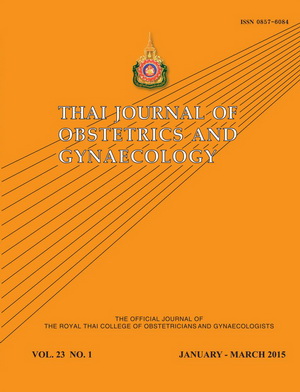Knowledge, Attitude and Practice Regarding Emergency Contraceptive Pills among Health Care Providers
Main Article Content
Abstract
Objectives: To examine the level of knowledge, attitude and practice about emergency contraceptive pills (ECPs) and related factors among health care providers.
Materials and Methods: Health care providers in at King Chulalongkorn Memorial Hospital were asked to answer self- administered questionnaire about ECPs. The questionnaire was divided into 4 domains which comprised of baseline characteristics, 10 multiple choice questions about the knowledge of ECPs which one point per one correct question, 11 questions on attitude toward ECPs ; health care provider’s concern about safety and efficacy of ECPs,12 questions on practice; proper patients to be prescribed ,experience and obstacles on prescription.Validity of the questionnaire was assessed by 2 experts. Reliability of knowledge section was tested by Pearson Correlation with 0.75 as a result. For attitude and practice sections, Cronbach coefficient alpha was used to calculate the reliability. The results of Cronbach coefficient score were 0.73 and 0.78 on attitude and practice domains, respectively. If the result is above 0.7, the reliability is promising. The data was collected during October 2013-May 2014.
Results: The overall knowledge mean score was 4.1. Fellows had the highest mean score of 5.3 while pharmacists had the lowest mean score of 3.1. Age and job category had an effect on the knowledge of ECPs (P =0.008, P<0.001) Concerning job category, the highest level of knowledge was found in fellows, followed by residents, nurses and pharmacists, consecutively. The age group with the highest level of knowledge was 31-40 years, which correlated with the age of these fellows.36.9% of nurses expressed their concern on ECPs’ effectiveness and safety while a lower number of pharmacists (18%) and fellows (8.2%) had a lower number of this concern. Job category had statistically significant association with a concern on ECPs (P = 0.009). Only 18.4% of doctors prescribed ECPs. Pharmacists gave advice on ECPs more often than nurses, residents and fellows.
Conclusion: Level of knowledge, attitude and practice on ECPs were different among health care provider groups according to medical status and role priority of their professionals. Factors affecting ECPs were knowledge, job category and age. While, factors that affected attitude were job category and knowledge. Factors affecting practicing were concern on ECPs effectiveness and safety.

